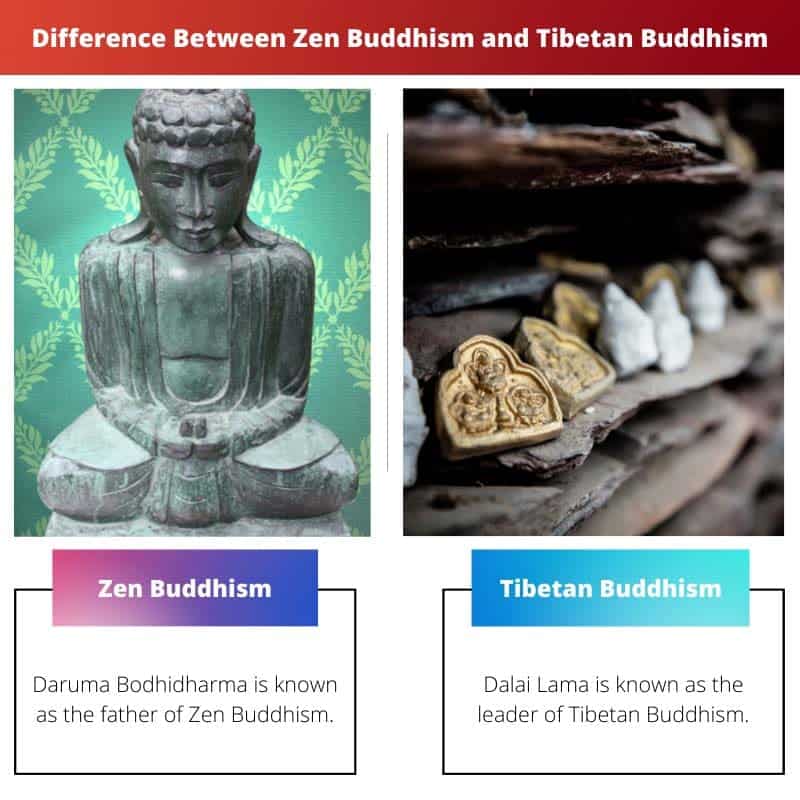Zen Buddhism and Tibetan Buddhism are the two most important schools of Buddhism. They are a part of Mahayana Buddhism.
Zen Buddhism began in China and spread to Korea and Japan.
Key Takeaways
- Zen Buddhism emphasizes meditation and personal insight, while Tibetan Buddhism focuses on rituals, mantras, and deity yoga.
- Zen Buddhism originates from Japan, whereas Tibetan Buddhism has its roots in Tibet.
- Tibetan Buddhism incorporates elements of Vajrayana practices, whereas Zen Buddhism adheres to the Mahayana tradition.
Zen Buddhism vs Tibetan Buddhism
The difference between Zen Buddhism and Tibetan Buddhism is that Zen Buddhism began in China, whereas Tibetan Buddhism is practised in Tibet. They also vary in the way they preach and practice Buddhism. Zen Buddhism is a minimalist way of Buddhism that means leading a simple life, whereas Tibetan Buddhism is more of an elaborate Buddhism, which can be seen in their activities in temples and monasteries.

Zen Buddhism combines both Indian Mahayana Buddhism and Taoism. Zen is a Chinese word pronounced as ‘Ch’an’, meaning meditation.
It was brought to China by the Indian monk ‘Bodhidharma’ around the 6th century.
Vajrayana Buddhism is taught along with Tibetan Buddhism. Nyingmapa, Kagyupa, Sakyapa, Gelugpa, and the new Kadampa tradition are the various Tibetan Buddhist groups.
Comparison Table
| Parameters of Comparison | Zen Buddhism | Tibetan Buddhism |
|---|---|---|
| Founder | Daruma Bodhidharma is known as the father of Zen Buddhism. | Dalai Lama is known as the leader of Tibetan Buddhism. |
| Origin | Zen Buddhism was brought to China by Daruma Bodhidharma in the 6th century. | Tibetan Buddhism was brought to Tibet by India at the end of the 8th century. |
| Minimalist | Zen Buddhism is a minimalist type of Buddhism. Leading a simple life is influenced by Zen Buddhism teachings. | Tibetan Buddhism is an elaborate kind of Buddhism. |
| More Religious | Zen Buddhism is a less formal way of Buddhism. It is less complicated and a minimalist kind of Buddhism. They also have some rituals to be followed. | Tibetan Buddhism is a more complicated kind of Buddhism with complex rituals and rites. |
| Methodology | Zen Buddhism is a way of following the breath and concentrating on the emptiness of the mind so that one can establish their desires, ambitions, and goals. | Tibetan Buddhism utilizes mantras and visualizations. They are recited to reach enlightenment of the soul. |
What is Zen Buddhism?
Zen Buddhism is a combination of Mahayana Buddhism and Taoism. It was introduced in China and spread across Korea and Japan.
Zen Buddhism was brought to China by an Indian monk, Daruma Bodhidharma, in the 6th century. It was popularized in the West by the Japanese.
It starts with controlling the mind through meditation that involves both mind and body. It involves fewer rituals and rites.
It focuses on clearing the mind through meditation and discovering the hidden answers within each person. They are known to be the soul of Buddhism.

What is Tibetan Buddhism?
Tibetan Buddhism is a combination of Mahayana Buddhism with tantric and shamanic, and the ancient Tibetan religion called Bon. Vajrayana Buddhism is taught along with Tibetan Buddhism.
Tibetan Buddhism has spread widely in Tibet towards the end of the 8th century. Trisong Destin, the Tibetan King, brought Tibetan Buddhism from India to Tibet.
Tibetan Buddhism has certain groups within the religious community. Nyingmapa is one such religious group founded by Padmasambhava which is the oldest among all.
In Tibetan Buddhism lay people and married people can also become and be Lamas. They also perform particular skills during rituals and rites. They are an elaborate form of Buddhism.

Main Differences Between Zen Buddhism And Tibetan Buddhism
- Zen Buddhism relies on meditation and controlling the mind and soul to seek answers from where the questions have arisen, whereas Tibetan Buddhism relies on mantras, rites, and yogic ways of following Buddhism.
- Zen Buddhism is a mixture of Mahayana Buddhism and Taoism, whereas Tibetan Buddhism is a combination of Mahayana Buddhism and an ancient Tibetan religion called Bon.


This article is a great resource for those who are interested in Eastern religions and spiritual practices.
It is very interesting that these two schools of Buddhism are so different and yet have some similarities. Zen Buddhism seems like it would be more appealing to me.
This is a well-written article with a lot of insightful information about Zen and Tibetan Buddhism. I appreciate the detail.
This information is fascinating. I wish more people understood the variations in Eastern religions and their practices.
Thank you for making the differences between Zen and Tibetan Buddhism so clear. I appreciate the comparison table.
I think the author may have simplified the differences between these two schools of Buddhism, and may have missed out on some important details.
I think the author has done a great job of highlighting the differences between Zen and Tibetan Buddhism, but should have included more about their interactions with other branches of Buddhism.
I am skeptical of the significance of these differences. To me, they seem minute.